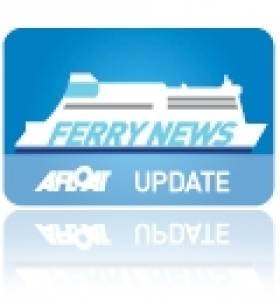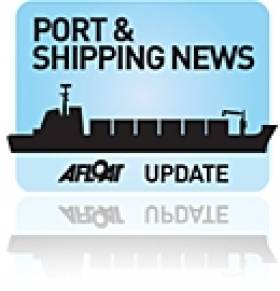Displaying items by tag: Stena Pioneer
Stena's Southern Sailings
In the meantime freight-only ferry Stena Seafarer is operating the St. Georges Channel route having arrived at Rosslare on a repositioning voyage from Belfast on 29th March.
Stena Seafarer (1975 / 10,957grt) was one of a trio of freight-ferry sisters that served the Larne-Fleetwood port route until its closure in December. Like her sisters Stena Leader (1975 / 12,879grt) and Stena Pioneer (1975 / 14,426grt) they were built at the West German shipyard of J.J. Sietas in Hamburg.
Stena Seafarer's sisters remain laid-up in Belfast and with each vessel over 35 years in service it would seem likely there are nearing the end of their careers, at least on the Irish Sea.
To provide additional passenger capacity the Stena 'Express' fast-ferry service will return to the southern corridor route between 1 July-4 September. The high-season sailings as usual will be operated by the InCat built Stena Lynx III which is to operate a daily single round trip in tandem with Stena Europe.
Stena Route To Close This Week
The Stena Leader went to lay-up in Belfast. In the meantime the remaining vessels Stena Seafarer and Stena Pioneer continue to serve the Northern Ireland-Lancashire link.When the route closes, it is expected that the pair will re-join the Stena Leader in Belfast, where all three sisters will be at lay-up berth at Albert Quay. The Swedish owned ferry operator uses the port's Victoria Terminal 4, for their HSS and conventional ferry service to Stranrear, Scotland.
In early December Stena Line announced the acquisition of two routes and four vessels from rivals, DFDS Seaways. The £40m deal sees Stena taking over the freight-only route between Belfast and Heysham operated by Scotia Seaways and Hibernia Seaways, a pair of Japanese built 13,000 gross tonnes vessels.
The second route is the Belfast-Birkenhead (Liverpool) route, served by two chartered 27,000 gross tonnes ro-pax sisters, Lagan Seaways and Mersey Seaways. The ro-pax vessels will be sold to Stena Line as part of the agreement between the two ferry operators.
Fire on Board Stena Ferry
Two lifeboats proceeded to the Stena Pioneer this afternoon after crew on the ferry issued a mayday call reporting a fire in their engine room whilst they were on passage to Fleetwood on the Irish Sea. A helicopter was also placed on standby.
Liverpool Coastguard received the mayday at 3.36 pm and made contact with crew on board the vessel, who reported that they still had full power and steering but that there was a fire in the engine room that they were fighting with their on board fire fighting equipment.
Liverpool Coastguard sent lifeboats from Fleetwood and Barrow to the scene. The fire was reported as out at 4.30 pm and the ferry is now docked at Fleetwood.
Liverpool Coastguard Watch Manager Paul Parkes said:
"A fire on a ferry 12 miles out with 46 people on board could potentially turn into a very serious incident, and so we acted quickly to send rescue resources to its aid. Luckily, the fire was dealt with using on board equipment and so the lifeboats escorted the ferry into Fleetwood where it was met by Lancashire Fire and Rescue service and an MCA surveyor."






























































